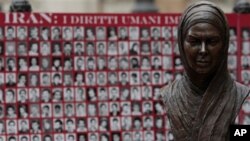Since protestors began to flood Cairo's Tahrir Square demanding the removal of long-time President Hosni Mubarak and insisting on political reform, the leaders of the Iranian regime have claimed solidarity with the demonstrators. Supreme Leader Ali Khamenei praised what he called their "explosive anger" and cast himself as their "brother in religion." President Mahmoud Ahmadinejad told the Egyptian people, "It is your right to be free. . . .and choose the type of government and rulers."
Yet when Iranian opposition leaders Mehdi Karroubi and Mir Hossein Mousavi asked for permission to hold a rally on February 14 in support of the protestors in Egypt, the Iranian government warned them not to do so. Indeed, shortly after, the government placed Mr. Karroubi under house arrest, arrested other opposition figures, and jammed international news broadcasts.
"The recent arrests and effort to block international media outlets underscores the hypocrisy of the Iranian leadership," said Tommy Vietor, spokesman for the National Security Council in Washington. "For all its empty talk about Egypt, the government of Iran should allow the Iranian people the same universal right to peacefully assemble and demonstrate in Tehran that the people are exercising in Cairo."
State Department spokesman P.J. Crowley posted a message on Twitter, the microblogging service, commenting on the same issue: "There is a certain irony about Iran's reaction to Egypt," he wrote. "What is good for Tahrir Square should be good for Tehran."
But it certainly wasn't when the Iranian people took to the streets in peaceful protest by the hundreds of thousands after the disputed presidential election of 2009. Iranian security forces brutally suppressed them with bullets and batons, killing dozens, arresting thousands, putting hundreds through show trials, and imposing harsh sentences, including the death penalty. The crackdown continues, with new reports nearly every day of arrests and long prison terms for civil society and human rights activists and the lawyers who defend them.
President Barack Obama has said there are "universal rights that all people deserve, in Egypt and around the world. The ability to speak your mind and have a say in how you are governed; confidence in the rule of law and the equal administration of justice; government that is transparent and doesn't steal from the people; the freedom to live as you choose."
No declarations of solidarity with the aspirations of protestors in Egypt can cover up the reality of what is happening inside Iran: the Iranian government's ongoing assault on the fundamental rights and freedoms of the Iranian people.
Iran And Egyptian Protests

Leaders of the Iranian regime have claimed solidarity with the demonstrators in Egypt.





















